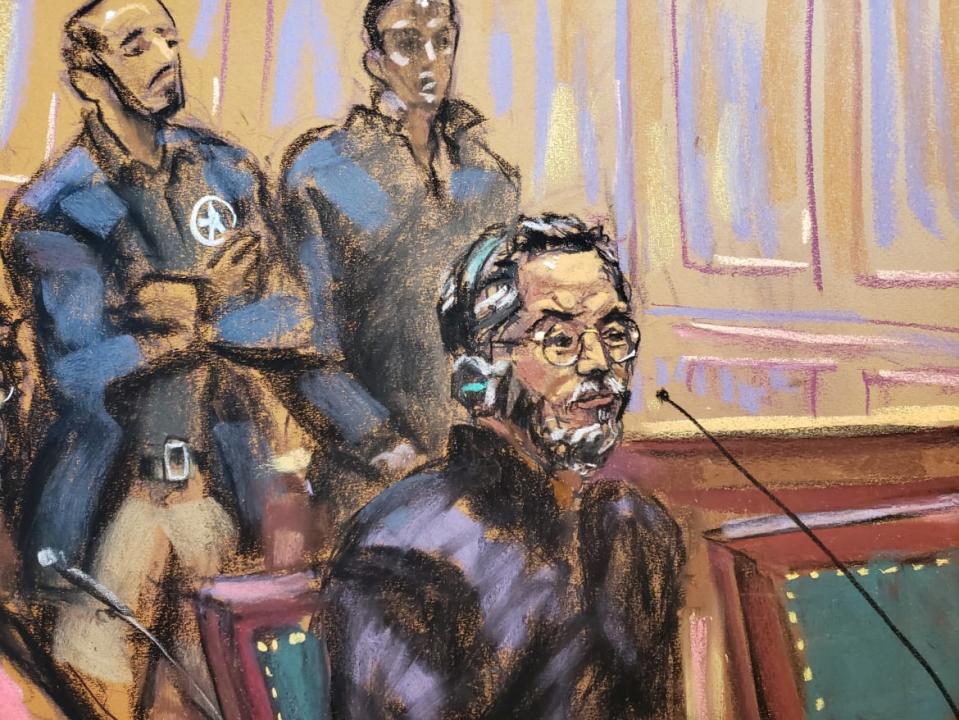Bannon BFF’s Latest Legal Woe: Being Stiffed on Pop Song Royalties

- Oops!Something went wrong.Please try again later.
- Oops!Something went wrong.Please try again later.
An entity affiliated with exiled Chinese tycoon and Steve Bannon ally Miles Guo claims it has been stiffed out of hundreds of thousands of dollars in royalties for more than a dozen pop and hip-hop songs the accused billion-dollar con artist recorded before ultimately finding himself in handcuffs.
Guo, a darling of the MAGA crowd, has been jailed at Brooklyn’s Metropolitan Detention Center since March as he awaits trial over what the Department of Justice called a “complex conspiracy to defraud thousands of his online followers out of over $1 billion dollars.” Among other things, prosecutors say Guo used the ill-gotten funds to buy himself a 50,000-square-foot mansion, a $3.5 million Ferrari, a $4.4 million Bugatti, a Lamborghini Aventador SVJ Roadster, a Rolls-Royce Phantom EWB, a $62,000 television, Chinese and Persian rugs worth nearly $1 million, a pair of $36,000 mattresses, and a $53,000 fireplace log holder.
The 52-year-old fled to the U.S. in 2014, as Chinese authorities prepared corruption charges against him. Since then, Guo—who is also known as Ho Wan Kwok, Guo Wengui, Brother Seven, and “The Principal”—has remade himself as a cryptocurrency evangelist, become a member of Mar-a-Lago, and helped perpetuate a blizzard of disinformation about, variously, COVID-19, the 2020 presidential election, and Hunter Biden. He also dove into the entertainment business, according to his organization’s official website.
“Mr. Miles Guo is an independent artist with his own music label—GMusic,” it reads. “He’s fully involved in the creation of all his musical works… Miles’ music is a rich combination of rock, pop, digital, and oriental folk music. With his natural voice and his sincere emotions, he was able to take the [sic] Chinese music under the international spotlight for the first time.”
Now, as Guo sits in a federal lockup awaiting a trial set to begin in April 2024, G Music LLC is suing a New York-based internet distribution service over “at least $301,700” in royalty payments for his music. One track specifically highlighted in the lawsuit, “Fight for Hong Kong,” is played regularly by Bannon, the former Trump adviser facing his own state fraud charges, between segments on his podcast. (G Music, as it is listed in the lawsuit, is sometimes stylized as “GMusic.”)
Guo’s organization, the New Federal State of China, says Guo “created an unprecedented miracle in the Chinese music genre on the international stage,” and “has repeatedly topped the iTunes music charts.” But in a lawsuit filed in New York State Supreme Court in June and not reported until now, G Music claims DistroKid, a digital distribution service that bills itself as “the easiest way for musicians to get music into Spotify, Apple, Amazon, Tidal, TikTok, YouTube, and more,” failed to pay any of the money Guo’s songs generated.
“They chose not to pay any of the royalties, to the tune of 300 grand, which they’ve shown on my client’s account for over a year,” Richard Freeth, G Music’s attorney, told The Daily Beast on Wednesday. “Just wouldn’t pay. Then, shortly after I learned about the situation, [DistroKid] closed the account.”
Guo’s songs, including “HCoin to the Moon” and “Take Down the CCP,” but especially “Fight for Hong Kong,” are “part of him getting the message out, I assume,” Freeth said.
G Music claims it released “no less than 13 songs” of Guo’s via DistroKid. “Fight for Hong Kong,” for example, generated $16,024.01 in revenue from 2,803,696 plays on a multitude of platforms, according to the suit.

Miles Guo (right) and former Trump strategist Steve Bannon.
“To be clear, [DistroKid] acknowledged approximately one year ago that it owed [G Music] no less than $301,007,” the lawsuit goes on. “As the reported amount remained static from 2022 while streams of [Guo’s] music have continued on numerous platforms throughout the world, it is self-evident that the amount actually owed to [G Music] is greater than $301,007.”
G Music says it has been asking for its money since early 2022. Freeth said he contacted DistroKid in writing and by phone, but still couldn’t get any answers. And, “to add insult to injury,” the lawsuit says DistroKid shuttered G Music’s account in February “without notice or explanation.”
Freeth told The Daily Beast that he has never had any contact with Guo, and isn’t sure of Guo’s precise role in G Music. He also specified that he represents G Music, not Guo personally. G Music does not list any company officials or a business address in its lawsuit. A G Music LLC associated in copyright records with at least one of Guo’s songs lists an address in Midtown Manhattan and a phone number that was out of service on Wednesday. Multiple requests sent to email addresses linked to the company went unanswered.
Although Guo’s own publicity materials paint him as the one behind G Music, its ownership structure also seemed to confuse Freeth, who said he didn’t think Guo held a stake but that “the people that own it are obviously to his, let’s say, cause.”
“They’re Chinese,” Freeth explained, in response to further questions about who exactly runs G Music. “I’ve been basically dealing with the manager of the company, his name is Phil. He’s also Chinese, I don’t remember his Chinese name. I just call him Phil. He goes by Phil.”

Guo Wengui appears in court after his arrest in March 2023.
Freeth, who faced potential sanctions earlier this year over his alleged role in a harassment campaign waged by Guo supporters against the Chapter 11 trustee in his bankruptcy case, said he met “Phil” while advising others at G Music on “copyrights, licensing, and stuff.”
“I was working with Phil on that, and then he told me about this problem that they had,” Freeth said.
Getting royalties from DistroKid is a “widespread” problem, according to Freeth, who said he hopes to turn the G Music lawsuit into a class action. (The company is not accredited by the Better Business Bureau, which gives it an “F” rating.)
“For us, they totally reneged on what they said they owed,” Freeth went on. “And that’s pretty much it.”
DistroKid, its director of creator services, and founder Philip Kaplan did not respond to requests for comment on Wednesday. The company does not have an attorney listed in court filings.
In addition to the $301,700 in royalties, G Music is also asking for incidental damages of $50,000, punitive damages of $300,000, and attorneys’ fees and costs of $100,000, plus “pre- and post-judgment interest to the extent allowable.”
Get the Daily Beast's biggest scoops and scandals delivered right to your inbox. Sign up now.
Stay informed and gain unlimited access to the Daily Beast's unmatched reporting. Subscribe now.

